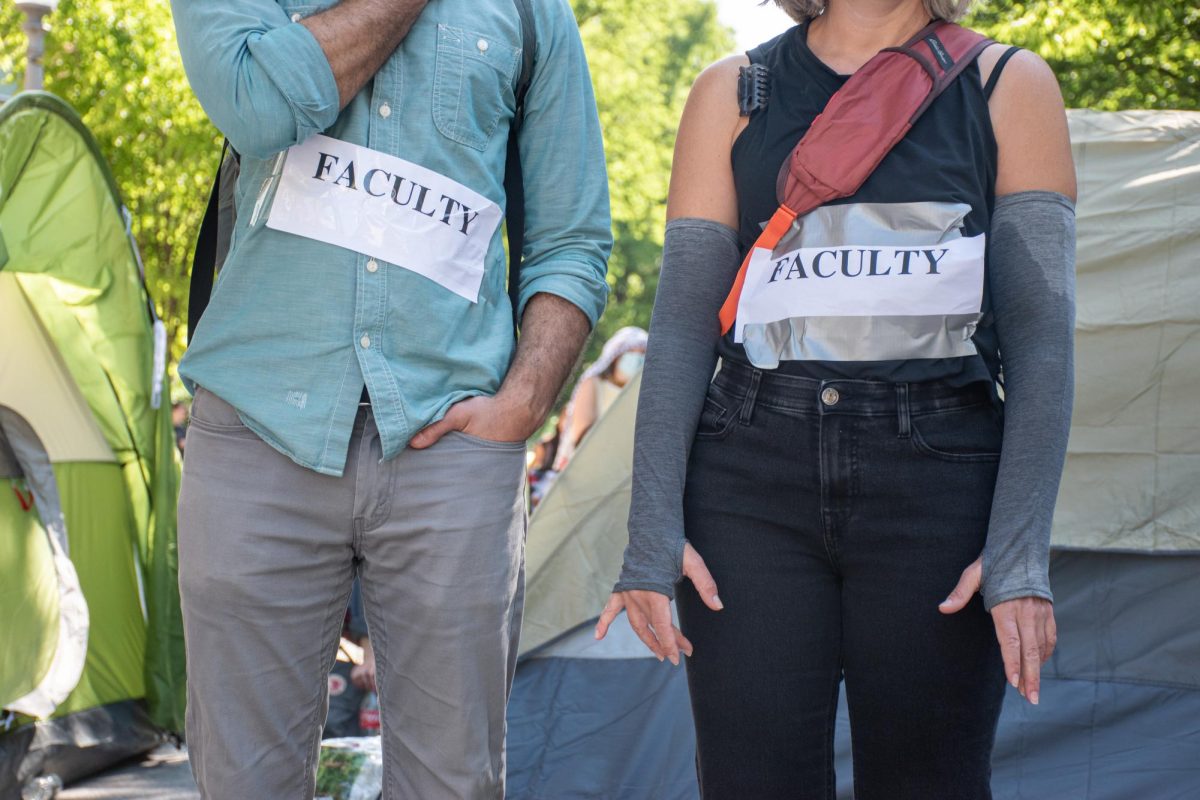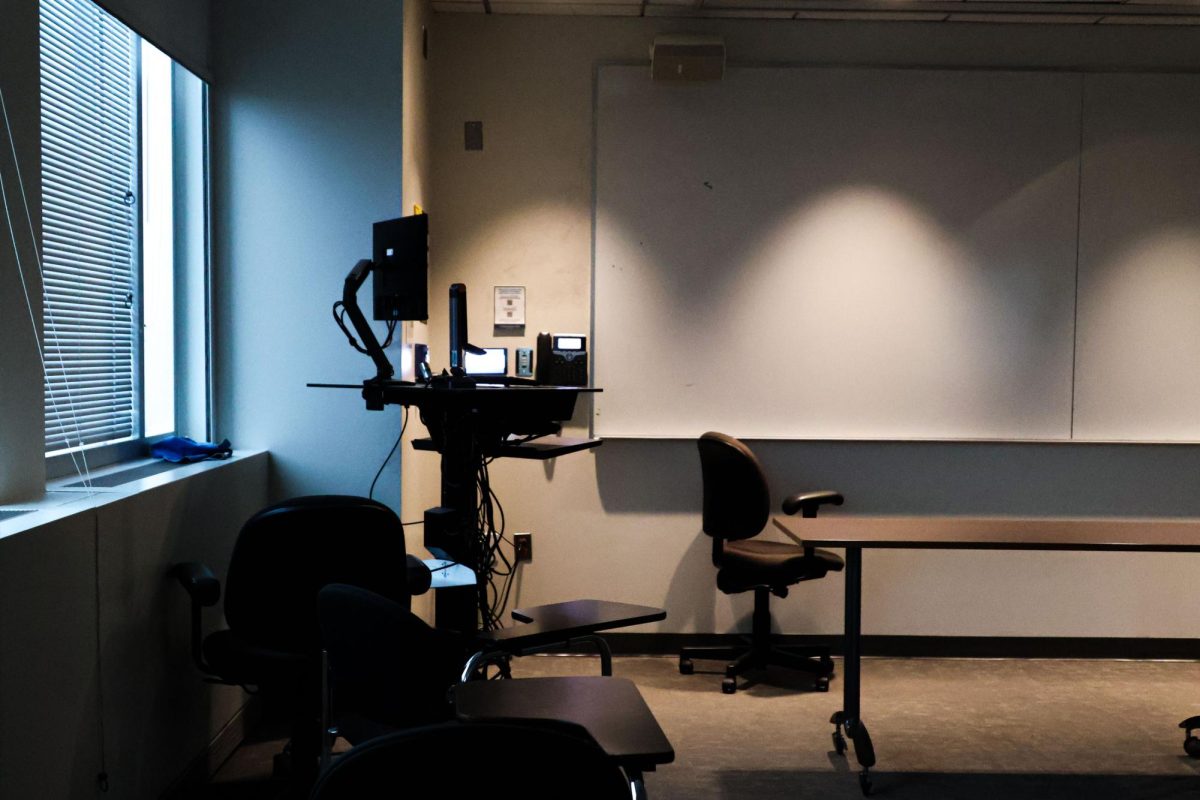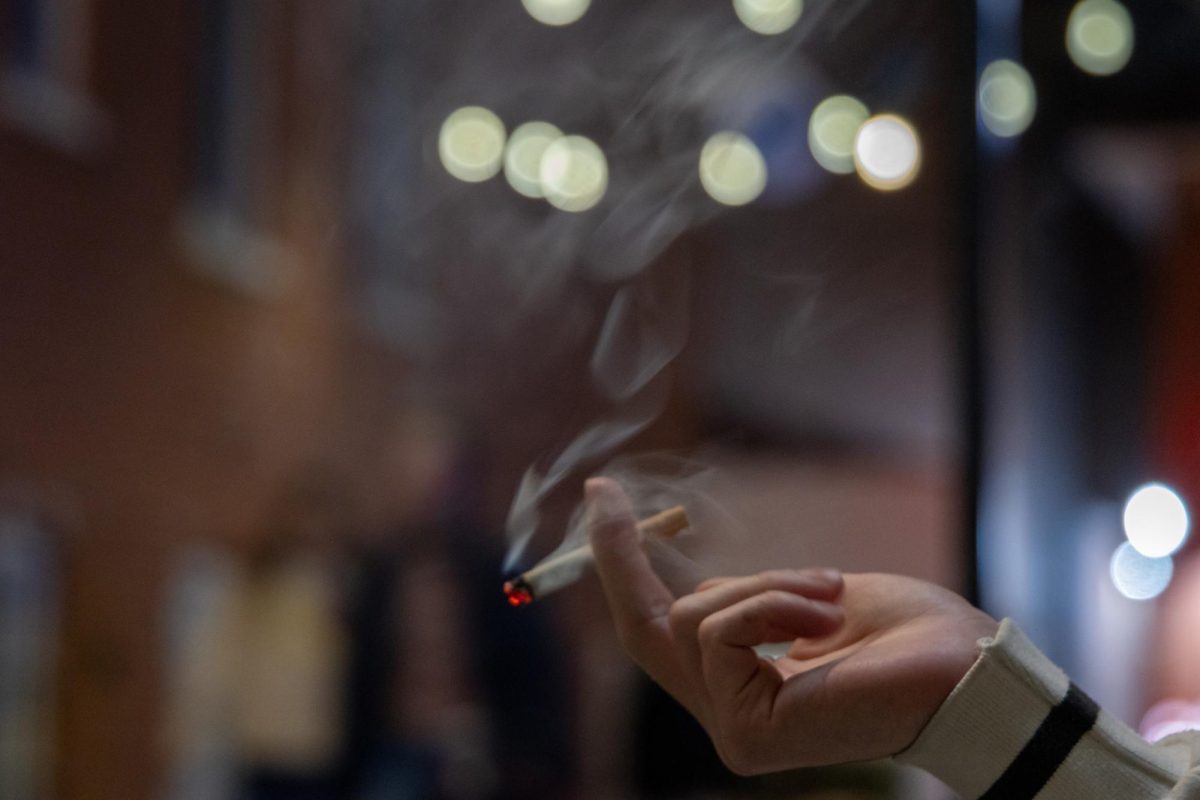Faculty closed out the spring semester Friday in a finals season defined for many by campus protests.
Before and after local police’s clearing of the encampment on Wednesday after two weeks of protest against the war in Gaza, faculty were pronounced in the campus dialogue on student protests. At least three petitions containing from faculty members have circulated online, in addition to discussions at a Faculty Senate meeting Friday about the encampment. Many professors joined the pro-Palestinian protest at University Yard as well as a “rally against antisemitism” blocks away. Others have shared their perspective on social media, and some have stayed silent.
On the first day of the pro-Palestinian encampment in U-Yard, GW Law relocated some of its final exams to buildings away from the demonstration to avoid distractions during tests. Some biology department faculty canceled exams on the 13th day of the protest and the fourth day of exams after Bell Hall closures, which borders U-Yard, due to campus safety lockdowns.
Faculty members from GW and across the D.C. region locked arms with one another, creating a barrier to protect students and their tents in case the police moved in to arrest demonstrators on the first day of the encampment. Professors also delivered speeches and interacted with demonstrators inside the encampment, including during some conversations with officials who appeared at the protest, as it progressed over the next two weeks.
“I’m here today, the same reason everybody else is because I’ve seen thousands of Palestinian children dead over the last six months, and it keeps on going, and I see my government funding it,” said Melani McAllister, a professor of American studies and international affairs, as she participated in the faculty demonstration.
Faculty members from across the DMV joined a rally to support Jewish students at the G Street Park on May 4. Lisa Schwartz, an associate professor of biomedical laboratory sciences at GW, held a sign that read, “Faculty against antisemitism” and said she came to the rally to show Jewish students the support of faculty.
“There are people that maybe haven’t been as vocal as those who recently have been on campus,” Schwartz said. “But we’re here, we care deeply about our students and we are hopeful that the crisis in the Middle East comes to a peaceful end.”
Faculty from local universities including GW released an open letter supporting student protesters April 26, the encampment’s second day. The open letter from “DMV Faculty for Academic Freedom” includes more than 512 signatures, 151 of which are from GW faculty as of Sunday and calls upon the Board of Trustees and the presidents and administrations of local universities to “recommit” to freedom of inquiry, expression and protest.
“As the mass killing of Palestinians and widespread destruction in Gaza continue, we also demand that you fulfill your responsibility to your campus communities to defend peaceful protesters, uphold academic freedom, and reject all pressures seeking to block access and criminalize peaceful encampments and demonstrations,” the April 26 letter reads.
Many prominent faculty members signed the letter, including Faculty Senate Executive Committee Chair Ilana Feldman, faculty senators Jennifer Brinkerhoff, Guillermo Orti and Gayle Wald, who served on the Presidential Search Committee in 2022.
William Burns, a professor of history and signatory of the open letter, said he signed the letter because he “broadly” supported what the students were advocating for. He said he believes a “repressive” police response doesn’t benefit the students or the University and that faculty must stand with students in the encampment.
More than 120 GW faculty members signed another petition from “DMV Faculty for Academic Freedom” on April 30, the encampment’s fourth day. The letter, also signed by Feldman, Orti, Brinkerhoff and Wald, urged the University to rescind suspensions and evictions of protesters in U-Yard, resist further assistance from local police and meet with student protesters to hear their demands. The petition came in response to organizers from the encampment saying the University had suspended seven demonstrators in the encampment days before.
About 113 faculty from local universities, including 43 from GW, responded to the April 26 open letter in their own statement drafted by Eric Arnesen, a professor of history, and Daniel Schwartz, a professor of history and Judaic studies on May 4. The letter took issue with the April 26 letter’s lack of mention of Hamas’ Oct. 7 attack on Israel, saying the faculty took a “one-sided view” on a complex issue. The May 4 letter said the other letter denounced claims of antisemitism at the protest as unsubstantiated and lacked consideration for the time and place of the protest while classes were in session and exams were taking place.
Schwartz said he probably would not have written the May 4 letter, despite his opinions on the encampment, had the April 26 faculty letter not included “outlandish” and “oversimplified” content. He said Arnesen and himself wrote the letter to appeal to a “spectrum” of ideological viewpoints.
After the police cleared the encampment in the early morning of May 8 — arresting at least six students and deploying pepper spray — faculty and staff released a petition addressed to University President Ellen Granberg and trustees that condemned the use of police force against students in clearing the encampment. The petition demands the University drop all criminal charges against arrested students, not pursue disciplinary action against students engaging in “nonviolent acts of civil disobedience” and incorporate faculty in decisions regarding student protests.
Faculty senators at a meeting on Friday called on Granberg and other officials to be more communicative and consult faculty when making decisions like those made throughout the duration of the encampment, like calling for the aid of the Metropolitan Police Department, working with students and taking disciplinary action against protesters.
Feldman said it shouldn’t be “news” to the administration that faculty are interested in being involved in the decision-making process.
“People expressed a great deal of frustration, and I would say anger that faculty have not been involved, despite the many, many, many faculty who have previously expressed,” Feldman said.
Orti, the chair of the Biology Department, a faculty senator, said it was “disheartening” that Granberg and Provost Chris Bracey were not communicative with the Faculty Senate Executive Committee after the committee had sent a letter to the administration calling for a “de-escalatory” approach to handling the encampment.
Orti recognized Sara Matthiesen, a professor of history and women’s gender and sexuality studies, to give a statement during the senate meeting where she questioned why GW’s immediate response to a protest organized by students was to call the police. On April 25, the encampment’s first day, Granberg asked for MPD’s assistance to relocate the encampment.
“Given the reality of police violence in the United States, I am deeply disturbed that our administration would subject our students, many of whom are students of color, to the danger of a police force, a danger that we all know can often be lethal,” Matthiesen said. “How can we possibly justify this approach to dealing with student protests?”
Donald Parsons, a professor of economics, a faculty senator and signatory of the May 4 letter, said the encampment has caused a “major rupture” in the student body since the community is divided on the conflict in Gaza.
“I can not believe that it’s not going to make its way into dorms and other social events at this University,” Parsons said. “We’ll have to wait until the whole Gaza thing evolves, however it will, but at some point, we’re going to have to bring our students together.”





